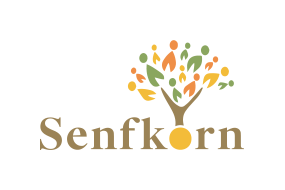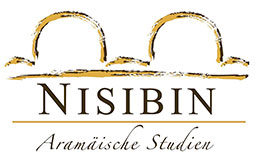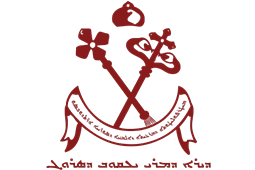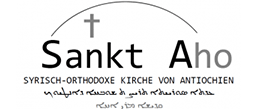“Bilingual day-care won’t make the child feel like an outsider.”
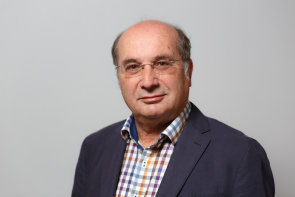
Background: Interview on the situation of the Aramaic language with Mr Werner Arnold
• Professor of Semitic Studies at the Seminar for Languages and Cultures of the Near East at the University of Heidelberg
• Currently rector of the Heidelberg University of Jewish Studies
Prof. Arnold, you have been researching New West Aramaic for many years, including several years spent in the Aramaic villages of Maclūla, Baxca, and Ğubbcadīn in Syria. You have written your doctoral thesis on New West Aramaic, and even produced a comprehensive dictionary for the dialect later. You have also worked as a visiting professor at various universities abroad, among other places in Israel and Syria.
You have a great many publications to your name. In a nutshell, you may be considered THE or one of the few experts in the fields of Semitic studies and the Aramaic language.
What made you decide to work in Semitic Studies back then?
I started out with an interest in oriental art. Art brought me in contact with the cultures of the Orient. Then I ended up finding the oriental languages more interesting.
You spent two years researching the language in Aramean villages in Syria later, including the well-known site of Maclūla. What was living there like?
I learned many things about people’s lives there. For example, I learned agricultural work, such as how to work the fields with a plough and oxen. A linguist needs to participate in such everyday activities in order to truly understand the language. Living in a village without any traffic was a good time for our children. My family has extremely fond memories of our time in Syria.
The Arameans from these villages are from Syria, as well as the majority of the Arameans emigrated from their native regions of Turkey (Tur Abdin) many decades ago. What is your impression of the economic, social, and educational development of these generations?
Well, they started out as a culture dominated by agriculture. Only the priests, monks, and acolytes, i.e. mostly the clergy, would enjoy any education to speak of. This was a development that happened in the course of centuries. Conditions were quite different in Syria from the 20th century onwards, and education was a lot more accessible. Most people were able to pursue a wide variety of professions here, as well as academic careers.
Here in the western countries, people usually would not live in a village. They would move to cities such as Berlin, Hamburg, Paderborn, Heilbronn, Augsburg, etc., where they were not living in close proximity with other Arameans, but rather with German neighbours. This required adjustments to living here. They founded associations and organisations, similar to those of the Germans around them. They were integrated into the German school system, too, enabling young people to pursue their careers.
Maintenance and preservation of the Aramaic language, however, is neglected. Back home, the language was not threatened since people simply spoke it in their everyday lives. The church took care of the liturgical language (“kthobonoyo”). Here in the Diaspora, the church can and should take care of the liturgical language. The more relevant part, however, is the spoken language, New Aramaic, which is no longer spoken in everyday life.
You are more closely familiar than virtually anyone else not only with the Aramaic language, but also with the Aramaic society here in Germany. What is your prediction for the Aramaic language’s fate in the next two decades?
I used to be more sceptical. Recently, I have seen some positive movements and developments, including TV stations, books, and other things [by the Kreis Aramäischer Studierender (KrAS; Circle of Aramaic Students) and NISIBIN – Aramaic Studies] in the Aramaic language. I think that the addition of German-Aramaic day-care centres is a positive development.
That sounds very optimistic. Let us assume that more than 90% of the watchers of Aramaic TV channels are older than 50 years, and that the bilingual day-care centres are not happening. What would you expect to happen then?
In that case, the Aramaic language is very likely going to be extinct very quickly. This has already happened to the Christian Maronites in Cyprus. The Maronites living in Cyprus speak Arabic. They stopped speaking Arabic with their children for many decades, so that the youngest native speakers are now around 60 years old. I advised them that the only chance they still have is getting their children to spend plenty of time with their grandparents now.
The same is true of the Arameans: Once the Aramaic language is gone here in Europe and in the Diaspora in general, it will be quite difficult to bring it back.
What are some typical early warning signs for an endangered language? How can parents or families recognise that a very tricky phase of the “language existence threat” has commenced?
It’s when the children answer in German rather than Aramaic when they are spoken to in Aramaic.
The children do not want to be any different from their environment. They don’t want to appear as strangers. They want to be just like all the other children, and they will refuse to use the language as a result. However, a bilingual day-care centre would stop such children from feeling like outsiders.
When a child stops speaking their mother tongue, that does not mean that they no longer understand the language. However, they are very unlikely to pass the language on later, so their own children will not learn it.
It is said that losing a large part of the language also means losing a large part of our identity. What is the role of language in identity formation?
It is very difficult to preserve identity without the language. This is evident, among other things, in the “Oriental” Christians who are NOT speaking Aramaic. They do not have this sort of identity. On the other hand, even Muslims maintain the Aramaic identity when they are Aramaic-speaking, as in the villages of Baxca and Ğubbcadīn in Syria that were mentioned before. They consider themselves Arameans rather than Arabs. The origin of the people and language is at the focus here, rather than their religion.
As a result, I can imagine quite well that many oriental Christians, including those that speak Arabic, would like to return to speaking Aramaic when bilingual day-care centres are available. The last few years have seen a movement of a linguistic return to Aramaic, also among the Maronites in Israel. The Maronites are now registering as Aramaeans with the authorities for their passports in the village Gish of the Aramaic Christians in Israel. This is promoted by the Israeli government.
Important as the language is, we need to encourage children at a young age. But even parents who deliberately speak Aramaic with their children report that their children will no longer respond in Aramaic once they have spent a certain amount of time in day care. The vast majority of parents finds this experience frustrating, and they stop using Aramaic with their children subsequently. What is the scientific assessment of such a situation?
It is virtually natural for the children to respond in German, which is the language of their environment and friends. I mentioned this briefly above already. It is important to note that the parents must not, under any circumstances, switch to German in this case. Unfortunately, this is exactly what happens most of the time. The children should at least continue to hear Aramaic at home, which will anchor the language in their subconscious. This means that they can pick up their mother tongue again and speak it in adolescence or as adults later.
Children of a certain age often start showing an interest in their history, culture, and ancestors. That is certainly the case with the Arameans. They will start wondering: “What kind of culture did we have? Was it just some farmers that spoke Aramaic or did we have a great culture?” Then, as they understand that Aramaic was spoken in many different forms and by many people, their interest grows. They learn that Jesus Christ and many scholars spoke Aramaic, and that their culture produced works of literature that are known to everyone, including tales such as “Daniel in the lion’s den” or “The portent on the wall” in the Old Testament. Those are some world-famous pieces of Aramaic literature.
What do you tell parents who are afraid that their children may not learn the national language, in our case German, sufficiently if they engage in bilingual education? Is there any real danger that a child may not learn the national language?
No. That would require many things to go wrong. The child would have to be virtually isolated from society. The Arameans are not living in anything like ghettos. A minority as small as the Arameans in Germany is not facing this danger at all. Because the children are surrounded by German everywhere, they will learn the German language easily as well. A bilingual day-care centre offers only advantages for children and improves their linguistic competence, as many studies document. Their brain synapses become much more densely linked, and such children will find the acquisition of 3rd and 4th languages much easier at a later time.
Can you see any risk of isolation of the Aramaic society by measures such as the establishment of German-Aramaic day-care centres?
I don’t know how that would happen with Arameans. As mentioned, we are not talking about a society living in ghettos. Rather than being segregated, they live spread out through their respective neighbourhoods in the towns and municipalities. I do not think that they would be able to isolate themselves in a modern society in particular considering what a small minority the Arameans are. We are talking about no more than 150,000 people spread out across Germany.
Rather than being in Aramaeans isolating themselves and no longer speaking German, the risk is in them ceasing to speak Aramaic. The Aramaeans are integrated very well. Most of them have German passports and are fluent in German. That is why a German-Aramaic day-care centre makes sense. It’s not a step towards isolation, but to help preserve the language. Children’s integration and self-confidence will be promoted even more by a bilingual day-care centre.
One last question for now: What would you recommend to preserve the Aramaic language in the long term and based on a solid foundation?
For one thing, it would be possible to train Aramaic teachers to teach their original language as well. I mean that those already teaching other subjects at school could be trained to teach Aramaic. As Aramaic is already taught as a language of origin in regular schools in North Rhine-Westphalia, other states surely could be asked to offer the same.
If no further language lessons can be offered in schools, skills will remain on a child’s level (day-care centre level). Aramaeans still speak to each other in Aramaic around the world, which is another factor that increases the need to communicate in the Aramaic language. If the language remains on a child’s level, the risk is that people will start talking to their friends and family in English. Because of this, language skills must be improved by offering additional language courses in schools.
Prof. Arnold, thank you very much for the informative interview. We wish you all the best for your future.
The interview was conducted by:
-Zeki Bilgic, Scientific Coordinator of NISIBIN – Research Centre for Aramaic Studies, Frankfurt
-Saliba Gabriel, Managing Director of Senfkorn Kindertagesstäte gGmbH, Paderborn
Help us!
What many may not know: The Aramaic language is highly endangered! The Christian ethnic group that speaks Aramaic is very small. The flight from wars, persecution and reprisals in the Middle East caused several waves of emigration from their home countries and major upheavals in the Aramaic-speaking community. The serious consequences: only a fraction of the community still speaks Aramaic today.
Our vision: We want to operate bilingual day care centers (German-Aramaic) nationwide. We are deeply convinced that in this way we can promote the Aramaic language from an early age.
Do you want to help preserve the Aramaic language? Then support us now with your donation!
